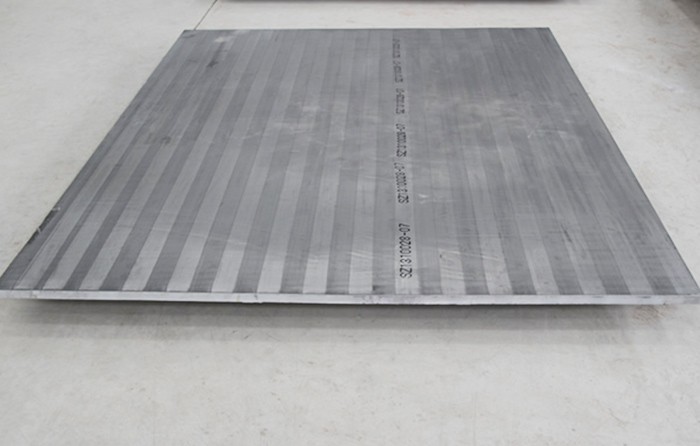Titanium-steel clad plate and its application fields
- 25 May, 2022
- 3702 views
Due to its excellent corrosion resistance, titanium is widely used as materials for various chemical reaction vessels and heat exchangers, and has been widely used in petrochemical, salt production, electric power, seawater desalination, marine engineering and other fields. However, titanium has a disadvantage, that is, the difficulty in processing leads to high cost, especially when it is used as a structural component.
What is Titanium Steel Composite Panel
Titanium-steel clad plate refers to a metal clad plate made of metal titanium with good corrosion resistance on the surface of ordinary steel plate. Titanium-steel clad plate not only has the strength of ordinary steel plate as a structure, but also has the corrosion resistance of titanium metal. The most important thing is that the cost has been greatly reduced, so it is widely used in various fields.
From the domestic and international production of titanium-steel clad plates, there are three main manufacturing methods of titanium-steel clad plates at present: explosion cladding method, thick plate rolling method, and continuous hot rolling method. The titanium-steel clad plate produced by the explosion cladding method and the thick plate rolling method is a thick plate, which is mainly used as a corrosion-resistant structural material. The titanium-steel clad plate produced by continuous hot rolling is a thin plate, and its main application field is marine civil engineering.

Application fields of titanium steel clad plate
1. Manufacturing of petrochemical and chemical container equipment
The manufacture of petrochemical and chemical container equipment is the traditional application field of titanium-steel clad plate materials, and its application volume has always ranked first. Titanium has good stability in various acid, alkali and salt media in the chemical industry, and titanium-steel clad plates can also play an irreplaceable role in petroleum refining plants and chemical plants.
Titanium also has special corrosion resistance to chlorine dioxide, chlorous acid, chlorite and other bleaching agents. Therefore, titanium-steel composite panels also have important applications in bleaching equipment in the textile printing and dyeing industry and paper industry.
2. Manufacturing of vacuum salt making equipment
Titanium and its alloys have excellent resistance to seawater, chloride solution corrosion and fluid erosion. The evaporation chamber made of titanium steel composite plate has good effects on slowing down corrosion, preventing salt scaling on the wall of the evaporation tank, prolonging the production cycle and improving the salt quality, and greatly reducing the use cost of salt plant equipment.
3. Desalination field
Titanium and its alloys have excellent resistance to seawater and chloride solution corrosion and fluid scouring, and titanium is non-toxic and harmless, which makes titanium-steel composite panels an ideal material for seawater desalination equipment.
4. Manufacturing of nuclear power equipment
Thick cladding (cladding ≥8mm) and large width (single area ≥20m) titanium-steel clad sheet is the main material for condenser tube sheets in nuclear power equipment, and the demand is large, and the application prospect is very broad.
To sum up, the titanium-steel clad plate has excellent corrosion resistance and strength, and is an ideal material for the manufacture of equipment in a corrosion-resistant environment. With the continuous improvement of the production process of titanium-steel clad plates, the application of titanium-steel clad plates will be more extensive and common.
- Category:
- Review
- No comments



